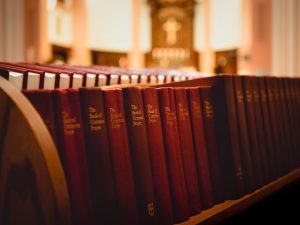Worship and Truth: How Worshipful Prayers Give Fire to Anglican Theology
Gavin+ Pate
 In Isaiah 37, King Hezekiah, the 13th King of Judah, prays one of the most beautiful prayers in the entire canon. He is facing certain destruction from the marauding Assyrians. They have conquered dozens of cities and Jerusalem is next.
In Isaiah 37, King Hezekiah, the 13th King of Judah, prays one of the most beautiful prayers in the entire canon. He is facing certain destruction from the marauding Assyrians. They have conquered dozens of cities and Jerusalem is next.
The Assyrian leader Sennacherib has been paid a tax by King Hezekiah, but despite this payoff, Sennacherib continues his march toward Jerusalem. The Assyrians are poised for an assault. They have begun mocking God, attempting to convince King Hezekiah that God is unable to save Jerusalem.
Things look bleak for King Hezekiah and Jerusalem. His next move was the most important of his reign. What did King Hezekiah really believe about God and himself? His next move would reveal the heart of his theology.
King Hezekiah decided to pray. He admits his powerlessness and as a child to his loving father, implores God to intervene. In commenting on Isaiah 37, Barry Webb writes, “Hezekiah’s prayer is so magnificent because it arises from a deep and true understanding of who God is, and is fundamentally an act of worship.” Webb continues, “The context of worship purges the cry of all pathetic self-interest and binds together the one who cries and the one who hears in a common desire and a common purpose.” It is King Hezekiah’s relationship with God that he depends on in his most needy moment.
It is our worshipful prayers that give fire to our theology. A mere statement of faith, kept on a shelf, simply will not do! Faith is not belief in the theoretical alone. It is critical that our faith become a living, active wave that courses through our lives. From examples like King Hezekiah, we find the prayerful heart of liturgical Anglican worship.
“Christian Churches have always expressed their grasp of the Faith in liturgy and song. Anglicans often say, Lex credendi lex orandi est or ‘The law of belief is the law of prayer.” writes Bishop John Rodgers. When the rubber meets the road, the question is not merely about what you believe, but what do you pray? This question is what motivates Anglicans to continue to use the Book of Common Prayer, our collection of prayerful liturgy and Archbishop Thomas Cranmer’s most brilliant work.
Years ago, I moved from a denomination that relied almost exclusively on their confessional document into Anglicanism. I was challenged by the place of primacy the Book of Common Prayer occupied. What about our Statement of Faith? Where is our written system of belief?
The 39 Articles are the essential doctrines of the Christian faith. The use of the 39 Articles varies within the Anglican Communion. Many African Anglicans, for example, require subscription to the 39 Articles for ordination. The mainline Episcopal Church in the United States, however, has the 39 Articles in the back of their BCP under the heading “Historical Documents.” Some Anglican ministers have worn clergy garments with 39 buttons, specifically unhooking the button that corresponded to the specific article that they refused to abide by.
The 39 Articles are best understood and read in conjunction with the Book of Common Prayer. There is an implicit synthesis between the Book of Common Prayer and the 39 Articles, accepted together as a complement to one another. Without the BCP, our faith would merely be a theory. Without the 39 Articles, our doctrinal positions lack the proper boundaries. Another way of expressing this synthesis is to put it in modern terms. If you were to click on the Anglican Communion’s “webpage” where it said “What We Believe” or “Statement of Faith,” it would immediately download both the 39 Articles of Religion and the Book of Common Prayer, where they would be displayed simultaneously on your computer screen. Without one or the other, the understanding of God falls short. Both are equally essential.
Anglicanism has historically been that via media, a place of grace for Christians of many stripes to find a home. Instead of championing just one aspect of Christianity, this emphasis on both the 39 Articles and the Book of Common Prayer enlarges the tent without sacrificing its integrity.
The heartfelt theology articulated in the liturgy is complemented by the precision of the 39 Articles. King Hezekiah knew that no document or oral tradition alone could save Jerusalem. He could write out his beliefs about God or could have consulted historic statements of faith. But his prayer in a time of crisis revealed the true nature of his belief in an active, involved Father who was listening and had the power to change history. It is our prayer, as Anglicans, that what we believe will never become a mere document of our history, but will pour forth when we are on our knees before Our Living God.

Gavin+ Pate has been a part of various church plants. He also spent three years working for a regional church planting network.
Category: Prayer, Spiritual Growth, Worship










